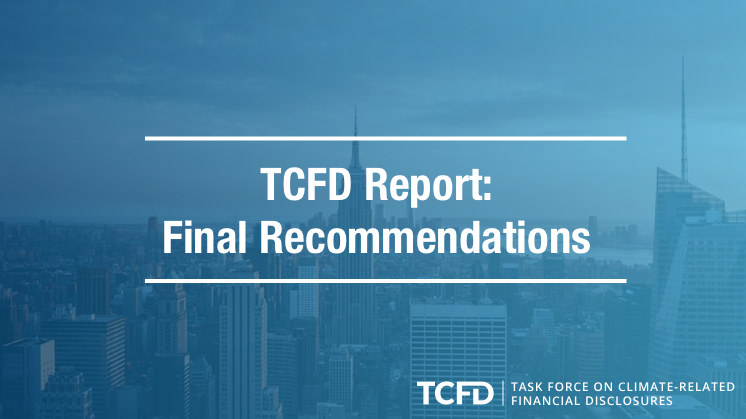Climate change risk management
Committed to transparency in the management of risks and opportunities arising from climate change
The Financial Stability Board (FSB) in 2015 created the Task Force on Climate-related Financial Disclosures (TCFD), a working group aimed at developing consistent disclosure standards for companies, enabling investors and other stakeholders to assess corporate climate-related financial risk. The initial recommendations were published in June 2017 and have effectively served as the industry standard for climate-related disclosure ever since. These recommendations focused on four key areas: governance, strategy, risk management, and metrics and targets.

The TCFD has evolved from a voluntary disclosure framework to a major influence on global regulation around climate-related financial reporting. Many governments and regulators are now embedding its principles into mandatory laws and regulations. It has been fundamental to the development of regulatory frameworks such as the Corporate Sustainability Reporting Directive (CSRD) in Europe, the UK Sustainability Disclosure Standards (SRS), and the IFRS S1 and S2 standards from the IFRS Foundation via the International Sustainability Standards Board (ISSB).
TCFD Report
TCFD report: Final recommendations.
ISSB
The need to harmonise sustainability reporting standards globally, driven by the IFRS Foundation’s International Sustainability Standards Board (ISSB), aims to facilitate the comparability of information for investors and other stakeholders.
Indeed, in July 2023, the Financial Stability Board (FSB) announced the conclusion of the TCFD’s work and that the inclusion of its recommendations in the ISSB Standards marked the completion of the TCFD’s mandate. The TCFD was officially disbanded in October 2023.
The FSB has requested the IFRS Foundation monitor companies’ progress in producing climate-related information [PDF] by tracking:
- the early adoption of ISSB Standards by companies; and
- the ISSB’s progress in ensuring interoperability between the ISSB Standards and other frameworks and standards.
The ISSB Standards provide a global framework for disclosing sustainability-related information. The IFRS S2 standard focuses on climate-related disclosures and is consistent with TCFD recommendations.
Corporate Sustainability Reporting Directive (CSRD)
The European Union’s Corporate Sustainability Reporting Directive (CSRD) and EU Taxonomy are examples of how TCFD recommendations have been incorporated into mandatory regulation in Europe.
The CSRD was adopted by the Council of the European Union on 28 November 2022. This directive extends the scope of the former Non-Financial Reporting Directive (NFRD) and sets new requirements for ESG reporting. The European Sustainability Reporting Standards (ESRS) were adopted on 31 July 2023. These standards define the obligations established in the CSRD and provide a detailed framework for disclosing sustainability information. ESRS E1 focuses on climate change and aligns with the TCFD recommendations.
United Nations High-Level Expert Group
Other initiatives and reference frameworks such as the United Nations’ Integrity Matters External link, opens in new window. and the Science Based Targets initiative (SBTi) complement the TCFD approach and define a framework for developing robust, science-based and comprehensive decarbonisation strategies and plans.
External link, opens in new window. and the Science Based Targets initiative (SBTi) complement the TCFD approach and define a framework for developing robust, science-based and comprehensive decarbonisation strategies and plans.
In 2022, the United Nations High-Level Expert Group published the Integrity Matters report to guide the definition of net-zero emissions targets for the private sector, financial sector and cities. It formed the basis of Secretary-General António Guterres’ call for the business sector to lead action by presenting accelerated climate-transition plans.
This report sets out 10 recommendations to ensure that climate targets and related plans be credible and avoid greenwashing: net-zero emissions must be achieved before 2050 across the entire value chain, with a pathway including interim targets. The plan must be transparent, science-based, and backed by a robust investment strategy rooted in renewable energy with a just transition and biodiversity protection focus. In addition, companies’ public and lobbying activities must align to promote climate ambition both privately and at government level.
Progress achieved by the Iberdrola Group
berdrola was one of the first companies to publicly commit to implementing the TCFD recommendations in its 2020 public reports. It also established an internal multidisciplinary working group to coordinate all efforts in this area.
In fact, as early as 2018 the company dedicated a section of its Non-Financial Information Statement (Sustainability Report) [PDF] to reporting on its alignment with these guidelines and the progress made.
During the initial development and implementation phases of the TCFD, Iberdrola participated alongside other electric utilities in a report promoted by the World Business Council for Sustainable Development (WBCSD), named “Implementing the TCFD Recommendations: Insights from the Electric Utilities Sector”, to help accelerate adoption of the recommendations.
In 2021, Iberdrola’s Board of Directors approved its Climate Action Plan, which constitutes the company’s transition plan and outlines the levers and actions that contribute to the electrification and decarbonisation of the broader economy, as well as the values and tools underpinning this vision of an energy model in harmony with nature and people.
In November 2022, Iberdrola published new short- and long-term emission reduction targets, validated by the Science Based Targets initiative, and its commitment to achieve net zero greenhouse gas emissions across its entire value chain before 2040, using 2020 as the baseline year.
In 2023, Iberdrola presented its Climate Action Plan to the United Nations, responding to the Secretary-General’s call and demonstrating its alignment with the 10 recommendations of the Integrity Matters report.
The Science Based Targets initiative (SBTi) has also certified that this trajectory is consistent with the goals of the Paris Agreement (1.5°C), in accordance with the SBTI CORPORATE NET-ZERO STANDARD.

Climate change
Committed to a decarbonised energy model.

Climate action
Leading the way towards a sustainable economy.

Climate policies and partnerships
Maintaining an ambitious climate agenda and a strong network of partnerships.

International agreements
25 years of searching for consensus on the fight against climate change.
Iberdrola’s 2024 Sustainability Reporting [PDF], drafted by the Board and approved at the General Shareholders’ Meeting in May 2025, is aligned with ISSB, CSRD and ESRS regulations.
This report details how the company manages its climate-related risks and opportunities, in line with TCFD recommendations and in compliance with ESRS E1 requirements. Iberdrola has integrated these principles into its sustainability strategy, ensuring transparency and consistency in its disclosures.
Iberdrola applies the principle of double materiality in its sustainability report, meaning that it considers both the financial impacts of climate change on the company (risks), and the company’s impacts on the climate and society, in line with the CSRD and ESRS. In its 2024 sustainability report, Iberdrola explains how it has applied this double materiality assessment to identify and prioritise the most relevant environmental, social and governance issues. The company has used a combination of stakeholder consultations, trend analysis and risk evaluation to ensure its report reflects the most critical matters for its business and stakeholders.







